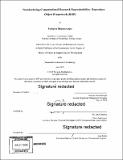Standardizing computational research reproducibility- Reproduce Object Framework (ROF)
Author(s)
Bhattacharjee, Pushpita.
Download1119537180-MIT.pdf (4.654Mb)
Alternative title
Reproduce Object Framework (ROF)
Other Contributors
Massachusetts Institute of Technology. Engineering and Management Program.
System Design and Management Program.
Advisor
Abel Sanchez.
Terms of use
Metadata
Show full item recordAbstract
The repercussions of the computational "reproducibility crisis" have increased in severity with passing time. As research is becoming tightly coupled with large sets of data and software computation, the conventional way of repeating experiments and reproducing results by only reading the research text is not enough. Even when researchers share their computational models it does not tell the whole story, as many of the nuances of the research is still missed. To address these challenges, this thesis work proposes a standard for defining a computational model with its configuration and behavior called The Reproduce Object Framework (ROF). It takes a digital automation approach in proposing a solution for the reproducibility challenge. This work draws parallels from the information technology industry in understanding how some of the reproducibility issues can be overcome by creating a standard framework. Standardization will help automate most of the reproducing effort, be cost effective and not depend on any one platform. The Reproduce Object Framework is a JavaScript Object Notation (JSON)-based lightweight standard to define the computational model and its configuration, inputs, results, and environment, in order to reproduce the model. It is machine readable and also human readable so that it can be verified very easily by anyone. Rapid scientific advancement depends on sharing knowledge far and wide and giving anyone who's interested equal opportunity to access the knowledge. Therefore, an open source standard can bring all stakeholders to the same page, and can immensely help with combating the reproducibility crisis.
Description
Thesis: S.M. in Engineering and Management, Massachusetts Institute of Technology, System Design and Management Program, 2019 Cataloged from PDF version of thesis. Includes bibliographical references (pages 50-52).
Date issued
2019Department
Massachusetts Institute of Technology. Engineering and Management ProgramPublisher
Massachusetts Institute of Technology
Keywords
Engineering and Management Program., System Design and Management Program.